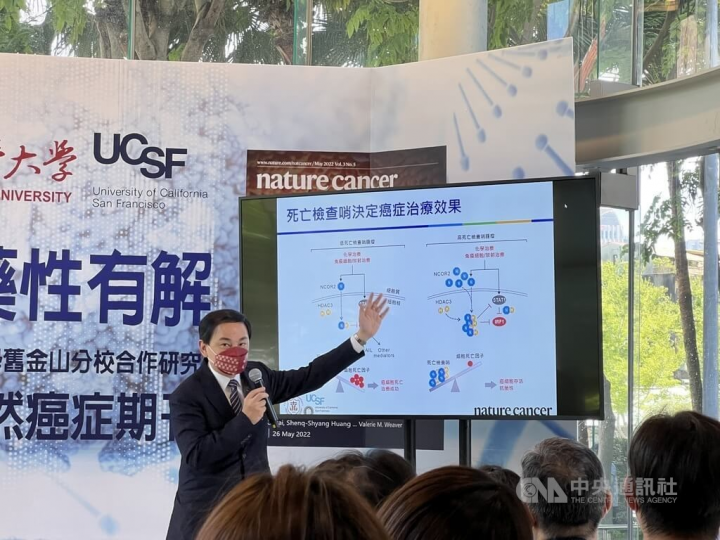
Taipei, Aug. 8 (CNA) Researchers from Taipei Medical University (TMU) and the University of California, San Francisco (UCSF) have developed a promising solution that could one day improve the therapeutic effects of chemotherapy and immunotherapy in cancer patients.
At a press event held to explain their findings, Tsai Kun-chih (蔡坤志), a professor with TMU's Graduate Institute of Clinical Medicine, said that roughly 70 percent of all solid tumors in patients are drug resistant prior to treatment.
These tumors not only respond poorly to chemotherapy but are also resistant to immune cells that are naturally produced by the body or given externally, said Tsai, who also heads the Taipei Municipal Wanfang Hospital's (WFH) clinical research center.
Traditional chemotherapy can only inhibit about 30 percent of cancer growth and immunotherapy, which has gained traction in recent years, is only effective for about 15 percent of patients, he said.
According to the school, its researchers and UCSF discovered five years ago that tumor cells in patients have a self-protection mechanism called the "death checkpoint" that make them resistant to chemotherapy, radiotherapy and immunotherapy.
At the heart of that resistance can be a protein called nuclear receptor corepressor 2 (NCOR2), which inhibits antitumor immunity and natural stress responses.
To overcome that problem, Tsai said the team developed a so-called "NCOR2 decoy gene therapy" that is capable of suppressing a tumor cell's resistance to drugs.
In various animal preclinical studies, the NCOR2 decoy therapy combined with either chemotherapeutic drugs or PD1 immunotherapy greatly improved the response rate of difficult-to-treat cancers such as triple-negative breast cancer and pancreatic cancer from the initial 30 percent to over 90 percent.
Speaking via teleconferencing, UCSF researchers said they started out the study on the more difficult breast cancers and pancreatic cancer but have also made good progress in the treatment of brain cancer.
It is believed that NCOR2 decoy gene therapy will be helpful for many different cancers in the future, they said.
According to Tsai, it is expected that their solution can enter the animal clinical stage within three to five years.
The study by the TMU and the UCSF titled "Screening of organoids derived from patients with breast cancer implicates the repressor NCOR2 in cytotoxic stress response and antitumor immunity" was published by the Nature Cancer journal on May 26, 2022.